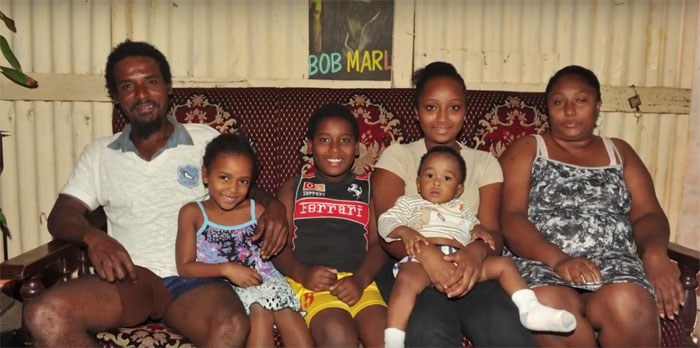“We’re Not in a ‘Lost Neighbourhood’ Any More”

In 2017, ATD Fourth World invited people around the world to document real-life “Stories of Change”. These stories are about situations of injustice and exclusion caused by extreme poverty. Written by activists, community leaders, and others, they show that when people work together, real change can happen.
More about “Stories of Change”.
By Louis Pierre Towsend
How people fought for public recognition of their neighbourhood; from a ‘lost neighborhood to a ‘splendid community’.
Video from an interview with Louis Pierre Towsend (Mauritius)


Play with YouTube
By clicking on the video you accept that YouTube drop its cookies on your browser.
I live in the town of Richelieu Petite Rivière in Mauritius. I went through a lot of hardships in my life before getting an apartment.
I used to live in Longère, a shanty town in Richelieu. There was no electricity. I had to walk a long way to get water. There was always mud everywhere. For many families, it was hard to live there.
Many of the people who came disdained us, even going as far as calling the area “The Lost Neighbourhood”, as if we were people who were lost.
Then we tried to get electricity. We tried to get lighting to be able to see clearly, because not everyone can afford a candle every day. So, we all got together to try and find a way to get electricity.
At the same time, a lady who knew a bit about politics came to help us find solutions. She told us, “You have ideas”. The people there said, “We have to organize a demonstration. Call some journalists so they’ll know about our problems.”
After hearing that, we all took the bus to Port Louis to gather in front of the electricity company building, and the journalists turned up. We spoke to them and asked them to relay our message to the authorities:
“We too are human beings. We need electricity to be able to live a bit better.”
Two weeks later, people from the company came to see us to discuss the electricity issue. They looked for excuses, saying we didn’t have an address. They told us, “You don’t have papers; you don’t have this; you don’t have that”. But they took down the names of almost everyone present. Three months later, we received notification that we had finally got electricity.
We then continued to move forward, together. Our houses started to fall into disrepair. We looked for alternatives, but any houses that were being built were not for us. It was close to the time of the general election. Some people were saying, “We have no choice; we must occupy those houses. That will force the government to find a solution for us.”
We stuck to this plan. We all followed what was happening. Being from the same neighbourhood, we wanted to move forward with a common spirit.
So we broke down some doors and occupied the houses.
The authorities threatened to send the police in, saying that we didn’t have the right to stay there and that we should leave. We said we wanted to know one thing: “Are we going to have homes?”
We stood our ground and didn’t give in. Finally, one day they came and took the names of everyone who was there. They said that a development was going to be built higher up, a smaller place where we would pay less and the homes would be built for us.
We were relieved when we saw them preparing the site and starting to build. We were going to have homes with electricity and water — a place where we would feel good.
That’s how we all got a home in this neighbourhood. Even after we came to live here, some people still called the place “The Lost Neighbourhood”. And then one day, I can’t remember who had the idea of calling it “The Splendid Community”. Everyone agreed; we thought it was a good name.
Before, we always had to walk in mud. When it rained, we couldn’t go out and the children couldn’t go to school because there was mud everywhere, even inside our homes.
It’s no longer the lost neighbourhood, but the splendid community. There are pylons for electricity; we have homes to live in. Our families are comfortable.

